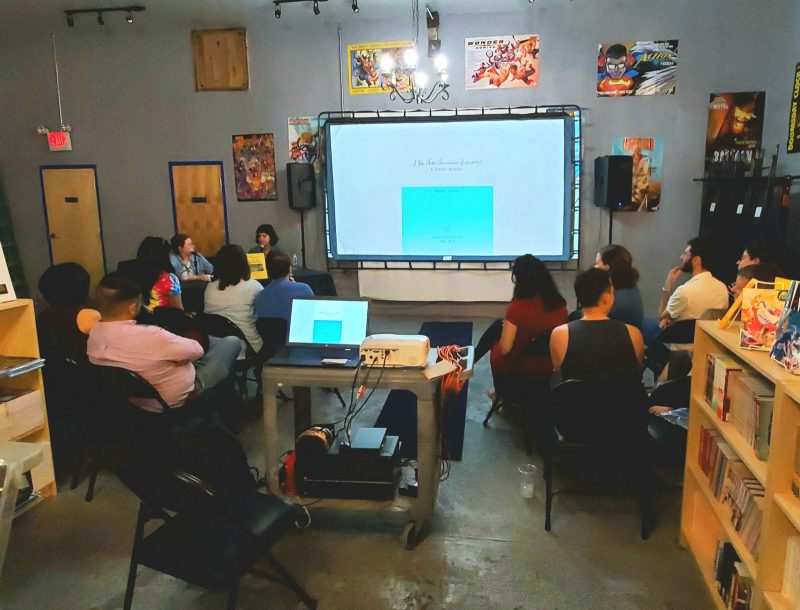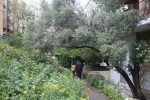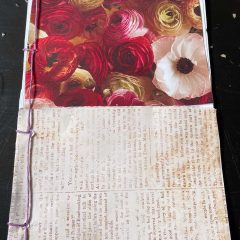
Blue Stoop is a “home for Philly writers,” a literary hub founded in May of 2018 that hosts events, writing workshops, weekend intensives, and more. Levi Bentley interviews Joshua Demaree, Philadelphia writer and Blue Stoop’s co-founder.
Levi Bentley: What was the inspiration for Blue Stoop?
Joshua Demaree: There literary centers around the country that occupy the same space that Blue Stoop does in Philly. The Loft in Minneapolis, Grub Street in Boston, The Porch in Nashville, Hugo House in Seattle, and The Lighthouse in Denver. When we were brainstorming how Blue Stoop would function, we reached out to all of them for wisdom. The name comes from a Thomas Devaney poem, “The Blue Stoop,” which was inspired by a Zoe Strauss photograph. Both Tom and Zoe were pumped to let us use it.
LB: How did you and Emma come to join forces?
JD: We both worked at the Penn Book Center at different times. Emma moved to Virginia for her MFA a few months before I started working there and James Gleeson, the longtime trade manager at the Book Center, told me how much I would love Emma. When she moved back to the city after her MFA, I reached out and we became fast friends.
LB: What was your process of deciding the shape and scope for the beginning of the project?
JD: After wisdom-gathering from other literary centers, we reached out to authors in Philly to get their input. Nathaniel Popkin was a huge help in those early days (still is!) while we were trying to define what Blue Stoop could be. So were Linda Gallant and Nic Esposito at The Head & The Hand Press.
One of our first decisions was to host a happy hour at Win Win Coffee Bar (931 Spring Garden St.) last June. We invited every Philly writer, reading series programmer, and literary organization we could think of. It ended up being standing room only and we ran it like a big community meeting, asking what people loved about writing in Philly, what issues they came up against over and over, and what an organization like Blue Stoop, dedicating itself to providing resources to Philly writers, might be able to do to address those issues. In the weeks after that meeting, Emma and I put together a game plan, with the ultimate goal of opening our own physical space someday (still working on it!). The happy hour turned out to be such a great feedback loop that we kept it up and still use it as a way to chat with Philly authors on our upcoming projects and to make ourselves available to anyone that wants to chat with us. (Next happy hour is June 16th at Win Win Coffee Bar from 5 to 7.)
LB: What have you accomplished in the first year?
JD: We were just discussing our upcoming year of programming and went back to reflect on the events we did this past year. After counting them up, we were shocked to find we’ve done twenty nine events since last August. We have five more to finish out our summer season. This includes our visiting author series, where traveling authors are paired with local writers for a reading and conversation, but also a reading for The Hatchery where participants from our first round of workshops read their work and an episode of LIVE at the Kelly Writers House with readings from our fall instructors.
In terms of classes, we have run six workshops this past year, with an enrollment of over 50 Philadelphia writers. We have three additional weekend intensives planned: the first has already run, a young adult novel intensive with the incredible Nova Ren Suma. We have two more coming up, a novel intensive with Annie Liontas and a poetry manuscript intensive with Raena Shirali, our Director of Pedagogy. Raena is the one who keeps her eye on our workshops, making sure they run at a high quality and that we build a family of talented Philadelphia authors for our pool of instructors.
I’ve explained Blue Stoop as author events, writing workshops, and happy hours. But there is actually a huge fourth component to our work, and that is our work connecting people. We get a lot of people who reach out with the seed of an idea and aren’t necessarily asking us to get involved or take the project on, but just to help them find some footing. In these cases, we send a lot of “You should talk to / I will mention this to so-and-so” emails. The best part of this past year has just been getting to know so many of the incredibly talented and tireless writers living here in Philly. It’s a joy when we can connect passionate people and watch them begin to build something new. It’s the bedrock idea behind Blue Stoop: writing builds empathy, empathy builds connection, and connections build communities.
The final thing I’ll say while reflecting over this past year is that there were three things we had hoped to accomplish someday and never imagined would happen in our first year: become an actual nonprofit, pay an honorarium to all of our visiting authors, and to offer some kind of financial aid to anyone that asked for it. We’ve reached all three of these goals in such a short amount of time and it is all thanks to the incredible groundswell of support we received from the community.
LB: What are your goals and dreams for the future of the project?
JD: The ultimate goal is to open an ADA-compliant space in the city, dedicated to promoting literary arts in Philly. The space will be used to host reading series, hold writing workshops, as a place for writing groups and book clubs to meet, and ideally, as a co-writing space for Philly writers to work alongside their own creative community and meet other Philly writers.
Until that becomes feasible, we’re happy to host our programming in independent bookstores and other cultural spaces around the city. This helps us build relationships with these vital parts of our community while also allowing us to bring people into spaces we love that they might not have been in before. We’re huge fans of the Asian Arts Initiative and try to regularly host events there and get new people into their gallery to see whatever exhibition is currently installed.
LB: What are your commitments?
JD: In our early days, Emma and I decided on a few things we would commit to in order to actually undertake Blue Stoop. First, we wanted to use it to promote writers of color, queer and trans writers, and working class writers. Second, all of our programming had to be geared towards providing resources to writers in Philadelphia.
And third, we wanted to create economic opportunities for early and mid-career authors living in or visiting Philly. Part of this was committing to paying authors adequately for their work. We spend a lot of time crunching numbers in order to make sure we pay our instructors better than the average rate of adjunct instruction at the local universities and colleges. We also provide a small honorarium (though hoping to be able to pay better in the future) to any visiting author that does an event with us.
We are also just at the beginning of a donation drive to create a specific scholarship fund geared towards providing one free space in each of our workshops for writers that specifically grew up in the greater Philadelphia area.
LB: What has been the feedback from participants in workshops and attendees at events?
JD: The feedback has largely been glowing. Event attendees seem engaged and excited; I love soaking up the afterglow of creative excitement you can feel in the room after a really good reading and discussion. We get generally good feedback from our workshops as well.
The criticism, while it definitely stings, is honestly often something we first lobbed at ourselves. We definitely have a diversity issue in our workshops, which is why 100% of our fundraising so far has been funneled into financial aid. We knew it would be an issue at the beginning, due to our limited funding and existing barriers of entry inherent to most creative communities, but once other people see your issues, it really pushes you to get creative in order to rectify the situation. The criticism, in many ways, has led us to making some of our best decisions.
LB: How has the organization expanded already?
JD: First off, we brought on more people. Blue Stoop expanded quickly beyond our initial hopes in the first few months and it became clear we would need more help. Raena was an early supporter that wanted to help us with our workshops. Boston Gordon, who has been running the amazing reading series You Can’t Kill a Poet for five years, is a professional fundraiser and grant writer and came on to help us with fundraising. We also have a group of volunteers that have been invaluable in helping us pull off our bigger events. We couldn’t have done any of this without them!
LB: How do you see the workshops functioning as separate from more formalized existing structures like MFA programs?
JD: Some of our workshop participants have kept meeting after their courses ended, which is so exciting. I had a master’s degree before going for my MFA and the best part of that first experience in grad school was the community of artists I was able to engage with and the friends and colleagues I left school still talking to and asking for advice regularly. When I went in for my MFA, I was elected president of our student organization and my go-to line was always “Courses last for two years, your cohort lasts forever.” I think I said it so much that they all started calling me MFA Dad.
Despite Emma and I both having our MFAs, we recognize that getting an MFA isn’t feasible for most writers. Who can just take two years off to dedicate to writing, or make the economic gamble of paying for a degree? But something most writers benefit from is community, so we aim to mold our writing workshops not just to invigorate the way participants think about craft but also to help them find an expanded writing community.
The evening schedule and short run times (eight weeks or two-day intensives) are meant to appeal to writers with actual lives: working full-time or children at home.









